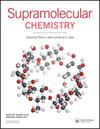A metal-organic capsule self-assembled by hydrogen bonds for adsorption of methylene blue
IF 2.6
4区 化学
Q3 CHEMISTRY, MULTIDISCIPLINARY
引用次数: 0
Abstract
ABSTRACTDyes are a class of hazardous chemicals that can cause harm to the environment and life on earth. However, it remains a huge challenge for the effective removal of the dyes. Herein, a new metal-organic capsule {[Cu(L)(bpy)(H2O)]·H2O}n (1) was synthesised by (4,4’-(((1,3,4-thiadiazole-2,5-diyl)bis(sulfanediyl))bis (methylene)) dibenzoic acid, 2,2’-bipyridine and CuCl2∙2 H2O under solvothermal condition. Interestingly, two inversion asymmetric units are connected by O-H···O and O-H···N to form a centrosymmetric capsule with cavity. The intermolecular interactions were further quantitatively analysed and visualised by the CrystalExplorer 17.5. Notably, complex 1 can effectively adsorb methylene blue (MB), and the adsorption performance is linearly correlated with MB concentration. When the concentration of MB was increased from 10 to 50 mg∙L−1, the adsorption performance of 1 was increased from 17.68 to 66.79 mg∙g−1, while reduced the MB removal efficiency from 88.4% to 66.4%. The adsorption process is suitable for the pseudo-second-order and the Langmuir model. Furthermore, complex 1 showed the good recyclability and stability for at least five runs.KEYWORDS: Metal-organic capsulehydrogen bondingπ-π stackingHirshfeld surface analysisdyes adsorptionmethylene blue Disclosure statementNo potential conflict of interest was reported by the author(s).Supplementary materialSupplemental data for this article can be accessed online at https://doi.org/10.1080/10610278.2023.2260042.Additional informationFundingThis work was supported by the [National Natural Science Foundation of China] under Grant [number 21771096].一种由氢键自组装的金属有机胶囊,用于吸附亚甲基蓝
摘要染料是一类对地球环境和生命造成危害的危险化学物质。然而,如何有效去除染料仍然是一个巨大的挑战。在溶剂热条件下,以(4,4′-((1,3,4-噻二唑-2,5-二基)双(磺胺二基)双(亚甲基))二苯甲酸、2,2′-联吡啶和CuCl2∙2h2o为原料合成了新型金属有机胶囊{[Cu(L)(bpy)(H2O)]·H2O}n(1)。有趣的是,两个反转不对称单元由O- h··O和O- h··N连接,形成一个带腔的中心对称胶囊。通过CrystalExplorer 17.5进一步定量分析和可视化分子间相互作用。值得注意的是,配合物1能有效吸附亚甲基蓝(MB),且吸附性能与MB浓度呈线性相关。当MB的浓度从10 mg∙L−1增加到50 mg∙L−1时,1的吸附性能从17.68 mg∙g−1增加到66.79 mg∙g−1,而MB的去除率从88.4%降低到66.4%。吸附过程适用于拟二阶和Langmuir模型。此外,配合物1在至少5次运行中表现出良好的可回收性和稳定性。关键词:金属有机胶囊,氢键,π-π堆积,hirshfeld表面分析,染料吸附,亚甲基蓝。补充资料本文的补充资料可通过https://doi.org/10.1080/10610278.2023.2260042.Additional info在线获取。本研究由[中国国家自然科学基金基金委]资助,基金号[21771096]。
本文章由计算机程序翻译,如有差异,请以英文原文为准。
求助全文
约1分钟内获得全文
求助全文
来源期刊

Supramolecular Chemistry
化学-化学综合
CiteScore
3.60
自引率
3.00%
发文量
5
审稿时长
2.7 months
期刊介绍:
Supramolecular Chemistry welcomes manuscripts from the fields and sub-disciplines related to supramolecular chemistry and non-covalent interactions. From host-guest chemistry, self-assembly and systems chemistry, through materials chemistry and biochemical systems, we interpret supramolecular chemistry in the broadest possible sense. Interdisciplinary manuscripts are particularly encouraged. Manuscript types include: high priority communications; full papers; reviews, and; Methods papers, techniques tutorials highlighting procedures and technologies that are important to the field. We aim to publish papers in a timely fashion and as soon as a paper has been accepted and typeset it will be published in electronic form on the Latest articles section of the website. The two most important review criteria are that the paper presents high-quality work that fits generally into the broad spectrum of activities in the supramolecular chemistry field. Under normal circumstances, Supramolecular Chemistry does not consider manuscripts that would be more suitable in a highly specialized journal. This includes, but is not limited to, those based mostly or exclusively on topics such as solid state/X-ray structures, computational chemistry, or electrochemistry. .
The two most important review criteria are that the paper presents high-quality work that fits generally into the broad spectrum of activities in the supramolecular chemistry field.
 求助内容:
求助内容: 应助结果提醒方式:
应助结果提醒方式:


